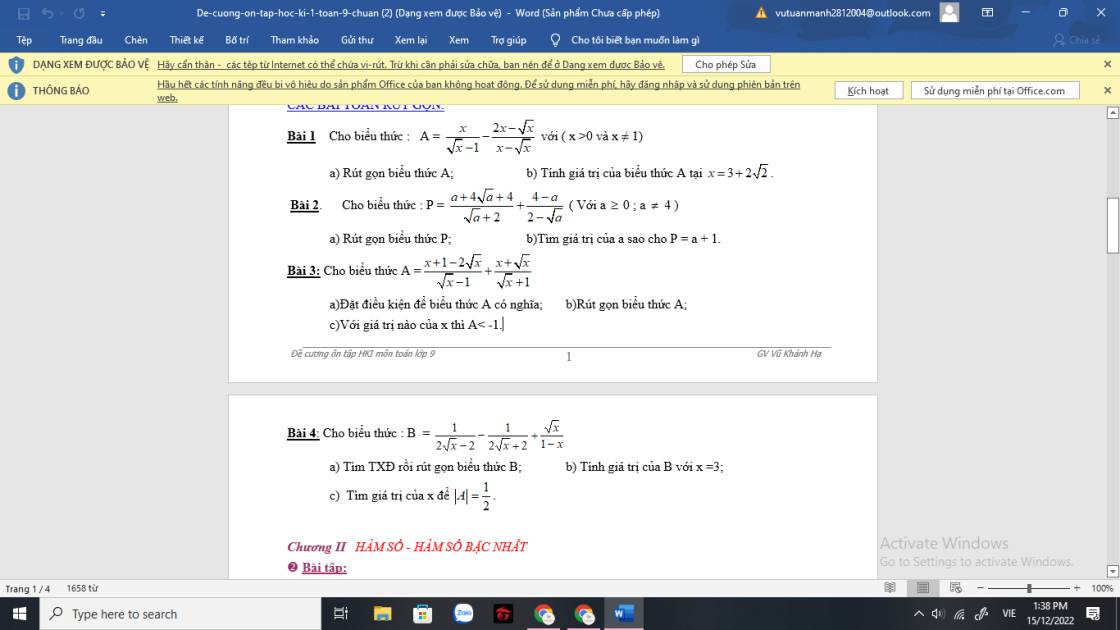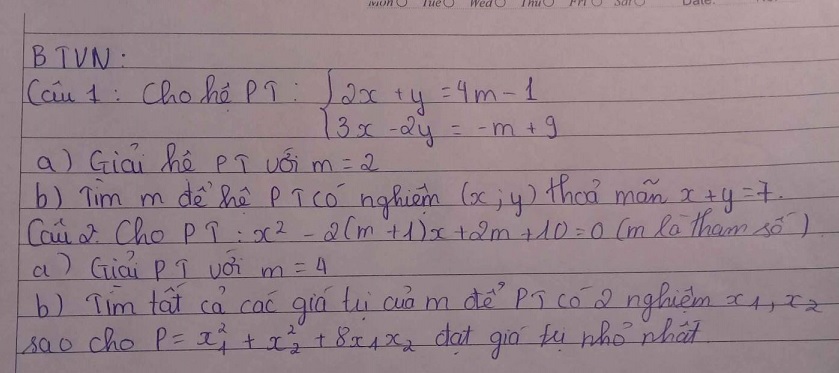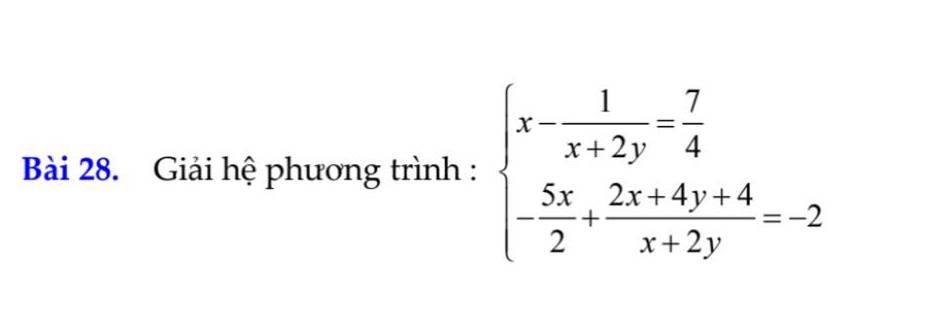
Hãy nhập câu hỏi của bạn vào đây, nếu là tài khoản VIP, bạn sẽ được ưu tiên trả lời.


b) \(\sqrt{x^2}=\left|-8\right|\)
\(\Rightarrow\left|x\right|=8\)
\(\Rightarrow\left[{}\begin{matrix}x=8\\x=-8\end{matrix}\right.\)
d) \(\sqrt{9x^2}=\left|-12\right|\)
\(\Rightarrow\sqrt{\left(3x\right)^2}=12\)
\(\Rightarrow\left|3x\right|=12\)
\(\Rightarrow\left[{}\begin{matrix}3x=12\\3x=-12\end{matrix}\right.\)
\(\Rightarrow\left[{}\begin{matrix}x=\dfrac{12}{3}\\x=-\dfrac{12}{3}\end{matrix}\right.\)
\(\Rightarrow\left[{}\begin{matrix}x=4\\x=-4\end{matrix}\right.\)

ĐKXĐ: \(\left\{{}\begin{matrix}2x-3>=0\\x+1>=0\end{matrix}\right.\)
=>\(\left\{{}\begin{matrix}x>=\dfrac{3}{2}\\x>=-1\end{matrix}\right.\)
=>\(x>=\dfrac{3}{2}\)
\(\sqrt{2x-3}-\sqrt{x+1}=x-4\)
=>\(\dfrac{2x-3-x-1}{\sqrt{2x-3}+\sqrt{x+1}}-\left(x-4\right)=0\)
=>\(\left(x-4\right)\left(\dfrac{1}{\sqrt{2x-3}+\sqrt{x+1}}-1\right)=0\)
=>x-4=0
=>x=4(nhận)

Mình không thấy câu nào cả thì giúp kiểu gì lỗi ảnh hay sao ý

1.
a. Em tự giải
b.
\(\left\{{}\begin{matrix}2x+y=4m-1\\3x-2y=-m+9\end{matrix}\right.\) \(\Leftrightarrow\left\{{}\begin{matrix}4x+2y=8m-2\\3x-2y=-m+9\end{matrix}\right.\)
\(\Leftrightarrow\left\{{}\begin{matrix}7x=7m+7\\y=\dfrac{3x+m-9}{2}\end{matrix}\right.\)
\(\Leftrightarrow\left\{{}\begin{matrix}x=m+1\\y=2m-3\end{matrix}\right.\)
Để \(x+y=7\Rightarrow m+1+2m-3=7\)
\(\Rightarrow3m=9\Rightarrow m=3\)
2.
a. Em tự giải
b.
Phương trình có 2 nghiệm khi:
\(\Delta'=\left(m+1\right)^2-\left(2m+10\right)=m^2-9\ge0\)
\(\Rightarrow\left[{}\begin{matrix}m\ge3\\m\le-3\end{matrix}\right.\)
Khi đó theo hệ thức Viet: \(\left\{{}\begin{matrix}x_1+x_2=2\left(m+1\right)\\x_1x_2=2m+10\end{matrix}\right.\)
Ta có:
\(P=x_1^2+x_2^2+8x_1x_2=\left(x_1+x_2\right)^2+6x_1x_2\)
\(=4\left(m+1\right)^2+6\left(2m+10\right)=4m^2+20m+64\)
\(=4\left(m^2+5m+6\right)+40=4\left(m+2\right)\left(m+3\right)+40\)
Do \(\left[{}\begin{matrix}m\ge3\\m\le-3\end{matrix}\right.\) \(\Rightarrow\left(m+2\right)\left(m+3\right)\ge0\)
\(\Rightarrow P\ge40\)
Vậy \(P_{min}=40\) khi \(m=-3\)
(Nếu bài này giải là \(4m^2+20m+64=\left(2m+5\right)^2+39\ge39\) là sai vì dấu = khi đó xảy ra tại \(m=-\dfrac{5}{2}\) ko thỏa mãn điều kiện \(\Delta\) để pt có nghiệm)

M A O B E F H K P Q
a/
Ta có
AE = HE; BF = HF (2 tiếp tuyến cùng xp từ 1 điểm ngoài hình tròn thì khoảng cách từ điểm đó đến 2 tiếp điểm bằng nhau)
=> AE + BF = HE + HF = EF (dpcm)
b/ Gọi P; K; Q lần lượt là giao của OE; OM; OF với (O)
Ta có
sđ cung PA = sđ cung PH (Hai tiếp tuyến cùng xp từ 1 điểm ngoài hình tròn thì đường nối điểm đó với tâm chia đôi cung chắn bởi 2 tiếp điểm)
sđ cung QB = sđ cung QH (lý do như trên)
=> sđ cung PH + sđ cung QH = sđ cung PA + sđ cung QB
=> sđ cung APH = sđ cung BQH
Mà sđ cung APH + sđ cung BQH = sđ cung AKB
=> sđ cung APH = sđ cung BQH = \(\dfrac{sđcungAKB}{2}\) (1)
Ta có
sđ cung KA = sđ cung KB (Hai tiếp tuyến cùng xp từ 1 điểm ngoài hình tròn thì đường nối điểm đó với tâm chia đôi cung chắn bởi 2 tiếp điểm)
Mà sđ cung KA + sđ cung KB = sđ cung AKB
=> sđ cung KA = sđ cung KB = \(\dfrac{sđcungAKB}{2}\) (2)
Ta có
\(sđ\widehat{MOA}=sđcungKA=\dfrac{sđcungAKB}{2}\) (góc ở tâm đường tròn) (3)
\(sđ\widehat{FOE}=sđcungPHQ=sđcungPH+sđcungQH=\dfrac{sđcungAKB}{2}\) (góc ở tâm đường tròn) (4)
Từ (1) (2) (3) (4) \(\Rightarrow\widehat{MOA}=\widehat{FOE}\)

ĐKXĐ: \(x+2y\ne0\)
\(\left\{{}\begin{matrix}x-\dfrac{1}{x+2y}=\dfrac{7}{4}\\-\dfrac{5}{2}x+2+\dfrac{4}{x+2y}=-2\end{matrix}\right.\)
Đặt \(\dfrac{1}{x+2y}=z\) ta được hệ:
\(\left\{{}\begin{matrix}x-z=\dfrac{7}{4}\\-\dfrac{5}{2}x+4z=-4\end{matrix}\right.\) \(\Rightarrow\left\{{}\begin{matrix}x=2\\z=\dfrac{1}{4}\end{matrix}\right.\)
\(\Rightarrow\left\{{}\begin{matrix}x=2\\\dfrac{1}{x+2y}=\dfrac{1}{4}\end{matrix}\right.\) \(\Rightarrow\left\{{}\begin{matrix}x=2\\x+2y=4\end{matrix}\right.\)
\(\Rightarrow\left\{{}\begin{matrix}x=2\\y=1\end{matrix}\right.\)

Gọi số xe dự định tham gia chở hàng là x (xe) với x>4, x nguyên dương
Mỗi xe dự định chở khối lượng hàng là: \(\dfrac{20}{x}\) (tấn)
Số xe thực tế tham gia chở hàng là: \(x-4\) (xe)
Thực tế mỗi xe phải chở số hàng là: \(\dfrac{20}{x-4}\) (tấn)
Do thực tế mỗi xe phải chở nhiều hơn dự định là 5/6 tấn hàng nên ta có pt:
\(\dfrac{20}{x-4}-\dfrac{20}{x}=\dfrac{5}{6}\)
\(\Rightarrow24x-24\left(x-4\right)=x\left(x-4\right)\)
\(\Leftrightarrow x^2-4x-96=0\)
\(\Rightarrow\left[{}\begin{matrix}x=12\\x=-8\left(loại\right)\end{matrix}\right.\)
Vậy thực tế có \(12-4=8\) xe tham gia vận chuyển









1: \(A=\dfrac{1}{\sqrt{x}+1}+\dfrac{2}{x-\sqrt{x}+1}-\dfrac{x+2}{x\sqrt{x}+1}\)
\(=\dfrac{1}{\sqrt{x}+1}+\dfrac{2}{x-\sqrt{x}+1}-\dfrac{x+2}{\left(\sqrt{x}+1\right)\left(x-\sqrt{x}+1\right)}\)
\(=\dfrac{x-\sqrt{x}+1+2\left(\sqrt{x}+1\right)-x-2}{\left(\sqrt{x}+1\right)\left(x-\sqrt{x}+1\right)}\)
\(=\dfrac{-\sqrt{x}-1+2\sqrt{x}+2}{\left(\sqrt{x}+1\right)\left(x-\sqrt{x}+1\right)}=\dfrac{\sqrt{x}+1}{\left(\sqrt{x}+1\right)\left(x-\sqrt{x}+1\right)}\)
\(=\dfrac{1}{x-\sqrt{x}+1}\)
2: A>=4/3
=>\(A-\dfrac{4}{3}>=0\)
=>\(\dfrac{1}{x-\sqrt{x}+1}-\dfrac{4}{3}>=0\)
=>\(\dfrac{3-4x+4\sqrt{x}-4}{3\left(x-\sqrt{x}+1\right)}>=0\)
=>\(-4x+4\sqrt{x}-1>=0\)
=>\(4x-4\sqrt{x}+1< =0\)
=>\(\left(2\sqrt{x}-1\right)^2< =0\)
mà \(\left(2\sqrt{x}-1\right)^2>=0\forall x>=0\)
nên \(2\sqrt{x}-1=0\)
=>\(\sqrt{x}=\dfrac{1}{2}\)
=>\(x=\dfrac{1}{4}\left(nhận\right)\)
kết quả phần 1 đâu bn